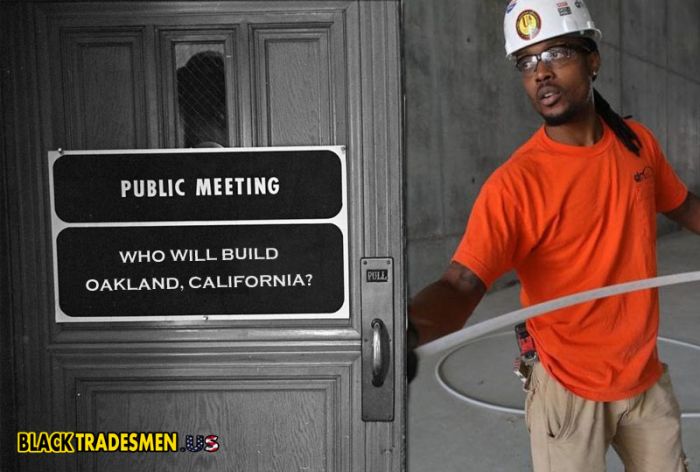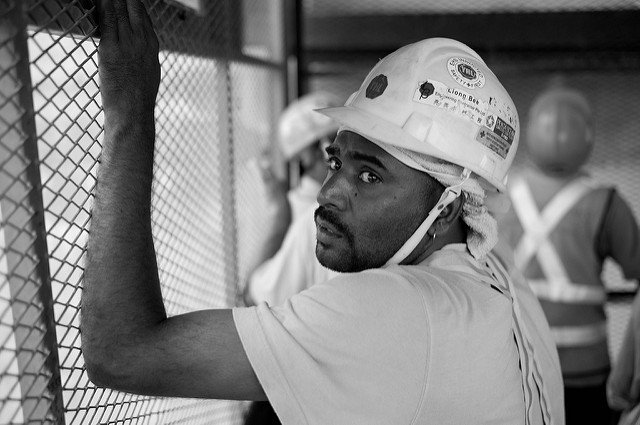Who will build Oakland? - The future of construction development in the city’s urban communities.

Last week the City of Oakland hosted their first of a series
of three ‘community engagement meetings’ to discuss the future of construction
development in the city’s urban communities.
Bay Area building trades unions are expected to back the
implementation of a ‘Project Labor Agreement (PLA) or what is also referred to
as a ‘Community Workforce Agreement’ (CWA) that would require developers to
hire only union labor and contractors for projects that are built on Oakland
city-owned land and or any project that involves city funding.
Local area black contractors and black tradesmen attending the
first outreach meeting last Thursday in East Oakland were concerned that they would
be excluded from job opportunities on future city projects in their own
neighborhoods and surrounding areas, if a PLA was implemented without
protections to black tradesmen and companies.
Speaking at the first
city held meeting, according to Post News, black contractor Eddie Dillard said,
“A Project Labor Agreements benefits white contractors. 90% Black contractors
are non-union.”
Many bay area building
trades unions, who dispatch workers to projects have been historically
segregated, and majority white organizations, admitting almost no Black
workers. And historically, these labor unions have been unwilling to release
data on racial composition within its workforce.
“We have been
asking the unions for 10 years how many African American members they have,
but they have refused” to release the data, said Dillard.
Most of those
locals “have zero Blacks in them,” Dillard said.
Union training
programs are not located in Oakland but in outlying areas, like Benicia and San
Jose, he said. “We have been asking the unions for 10 years how many African American members they have, but they have refused” to release the data,
Dillard said.
The construction industry in Oakland and across the United
States has a long recorded history of racial discrimination within its
workforce. Oakland, CA has a long history of black tradesmen and contractors
fighting for the fair treatment of their brothers and sisters in the trades,
such as
Construction is hands down one of the most lucrative and
rewarding careers for young black men in the United States without a high
school, but yet thousands of them have been discriminated against, and in some
cases completely locked out of an industry that their black forefathers
spearheaded in America 400 years ago.
Recently, the
unemployment rate for black people in the Bay Area reached an alarming 19% just
6-years ago, according to 2013 U.S. Census Bureau data, and although the
unemployment rate has gone across the state, many black Oakland residences have
not felt the change.
In contrast, a 19%
unemployment rate for white workers would be declared a city emergency if that
data was true.
While a traditional
PLA could benefit the over 30 unions in Alameda County, black construction
tradesmen and contractors are worried that if the PLA agreement is improperly implemented it would further solidify
the staunch racism and discriminatory hiring practices running amuck in the Bay
area construction trades unions.
The Oakland city council is expected to come to some type of agreement with the politically powerful labor unions and implement a PLA. Currently, there is no formal Project Labor Agreement (PLA) on the table for the city to consider.
But what about the
black working class citizens of the city, the voters, the black men and women
who build the city and are pushed to the wayside thru racist practices?
Darlene Flynn, director of the Department of Race and Equity
in an interview with the Oakland Post,
said “in evaluating how an agreement might be written to produce more equitable
outcomes, we need to look at the barriers, and it’s best to talk to those who
are closest to the challenges.”
In fact, cities and states are increasingly adopting
“targeted hire” standards and pre-apprenticeship programs to ensure that local
residents and historically disadvantaged black residents, low-income residents,
and residents with past involvement with the criminal justice system are able
to obtain construction jobs created with the support of public expenditures.
San Francisco, for
example, has significantly expanded access to publicly supported construction
projects by mandating that local residents complete 30 percent of a project’s
total work hours and 50 percent of its apprenticeship hours as well as by
partnering with industry, labor, and community nonprofits to create an 18-week
pre-apprenticeship program.
And the Los Angeles County Metropolitan Transportation
Authority adopted a policy in 2012 that requires that 20 percent of employees
on construction projects be apprentices and that 10 percent be from
disadvantaged communities.
However, President Trump is undermining the power of these
sorts of programs to raise standards for working people. In 2017, the Trump
administration announced that it was ending a pilot program at the U.S. Department
of Transportation that allowed communities to establish local hire preferences.
Often acclaimed as effective, pre-apprentice
programs have been a way for construction companies to pay workers less for the
same work, and is also a way for some non-profits to act as a gate-keepers to
the construction industry, often assigned with the task of filtering through potential
black tradesmen to find the best candidates for entry level work that tradesmen
of other races are outright hired for without completing a ‘Pre-apprentice
program.’
Currently, the Trump administration is establishing a parallel apprenticeship system that will allow third-party industry groups outside of the construction trade unions to develop construction apprenticeship programs accredited by institutions approved at the Federal level by the Department of Labor.
And although sometimes
effect at recruiting talented black tradesmen and women, these types of pre-apprentice
and apprenticeship programs do not help veteran black tradesmen and women at
all remedy work force discrimination they encounter on a daily basis at
job-sites across the U.S.
And although
President Obama took executive action to ensure that companies comply with wage
laws, and anti-discrimination protections before they receive federal
contracts, President Trump signed legislation to roll back some these
protections before they were fully implemented.
Lawmakers in Congress should require companies that apply
for federal infrastructure funds to report on their record of compliance with
workplace laws. If they have a poor track record, lawmakers should require them
to come into compliance before they are able to receive any federal funding.
In Oakland, “These
are questions that need to be asked and answered,” said Flynn.
“In these meetings, we are trying to find out who has been
affected, what their experiences have been, who might benefit and whether they
ran into barriers that have resulted in the disparities that we see, looking at
how we can incorporate ways to offset these barriers,” said City of Oakland
Employment Services Supervisor, Jonothan Dumas, according to Post News Group.
Some of the questions
the city wants to address:
*Should a defined
percentage of the hours on city projects go to local workers (such as 50
percent)?
*Should there be a
requirement to hire the formerly incarcerated?
*Should some of the
jobs be reserved for people who live in certain Oakland zip codes?
*What should be the
requirements for hiring local apprentices?
*Should there be
funding for training and removing barriers to employment?
The next community
engagement meeting will be held Saturday, Aug. 10, 10 a.m. to noon, at the
West Oakland Youth Center, 3233 Market St. in Oakland.
In conclusion, while
community organizations, labor organizations, training intermediaries, and the
public workforce system have made significant progress in recent decades to
expand access to construction trades, more must be done to organize black workers and expand the scope of
high-quality apprenticeship programs and increase access and pay for
historically disadvantaged black communities.

